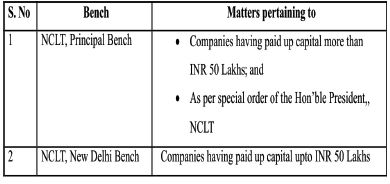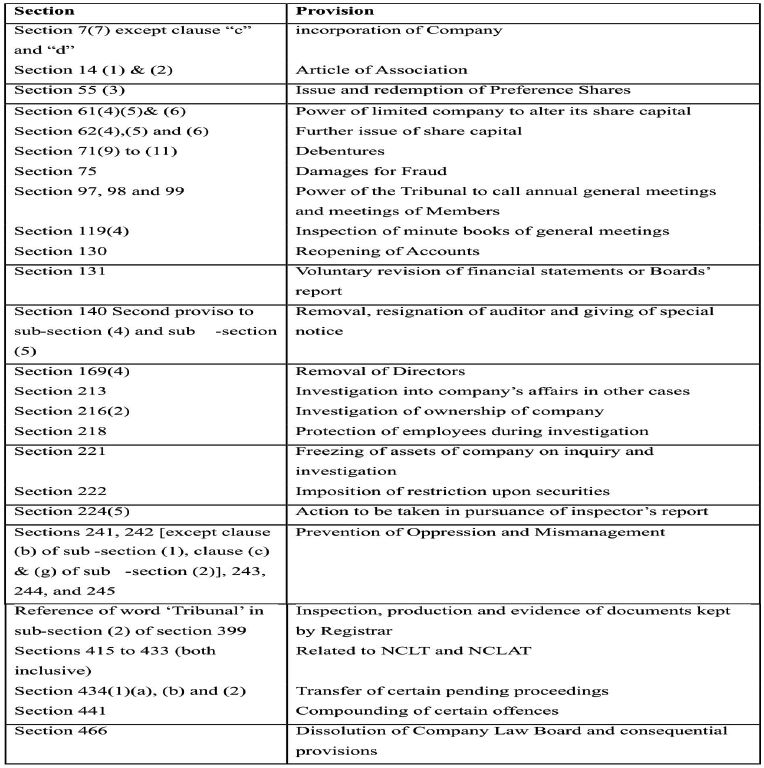INTRODUCTION
The Ministry of Corporate Affairs ("MCA") vide notification dated June 01, 2016 ("Effective Date") has constituted the National Company Law Tribunal ("NCLT") and its appellate authority, the National Company Law Appellate Tribunal ("NCLAT") with effect from such date. The NCLT and NCLAT, the quasi judicial bodies, shall adjudicate and decide all issues relating to company law in India. With the constitution of much awaited NCLT and NCLAT, the Company Law Board ("CLB") constituted under the Companies Act, 1956 ("1956 Act") has been dissolved from the effective date and all existing matters, proceedings or cases before CLB have been transferred to the NCLT. The NCLT has been constituted by the Central Government i.e. MCA under the powers conferred by section 408 and 410 of the Companies Act, 2013 ("2013 Act").
There are three Notifications dated June 1, 2016 issued by the MCA for the following purposes:
i) Constitution of NCLT and NCLAT1;
ii) Dissolution of CLB as per section 466 of the 2013 Act2;
iii) Notifying various sections of the 2013 Act; and Location of NCLT Benches3.
The constitution of NCLT and NCLAT is a step towards improving the ease of doing business by bringing all aspects of company law matters under a single jurisdiction.
BACKGROUND
The idea of setting up NCLT was proposed for the first time by the Justice Eradi Committee constituted in 1999 to examine the laws relating to Insolvency and Winding up of Companies. The committee recommended the setting up of a national tribunal.
In furtherance to the recommendations of Justice Eradi Committee, the Companies (Second Amendment) Act, 2002 (2002 Amendment Act) vide insertion of new Parts IB and IC provided the provisions for setting up of NCLT and NCLAT to replace the existing CLB and for transfer of all matters or proceedings or cases pending before the CLB to the NCLT and to dispose of such cases in accordance with the provisions of the Companies Act, 1956 and this 2002 Amendment Act.
The said 2002 Amendment Act was never notified as it was challenged in the High Court at Madras by the Madras Bar Association and the constitutional validity of the same was decided by the constitution Bench of the Hon'ble Supreme Court in Union of India v. R. Gandhi, President, Madras Bar Association [(2010) 11 SCC 14 on May 11, 2010. The Hon'ble Supreme Court upheld the legislative competence of Parliament to create the NCLT and the NCLAT, but the particular structure of the NCLT and NCLAT proposed by the 2002 Amendment Act was held to be unconstitutional. The Government was required to make amendments to the 2002 Amendment Act including but not limited to the selection of members, tenure of members, and qualification of the judicial and technical members of the Tribunal before it could set up actual and functional Tribunals.
However, even after passing of Hon'ble Supreme Court judgment in May 2010 with respect to constitutional validity of setting up of NCLT and NCLAT, the same could not be established. Time passed and the Parliament of India notified the Companies Act, 2013 ("2013 Act") which replaced the 1956 Act and included sub-stantial provisions with respect to the establishment, powers, operations and jurisdiction of the NCLT and NCLAT in line with the necessary changes required by the Hon'ble Supreme Court in May 2010 judgement.
However, the corresponding provisions relating to NCLT and NCLAT prescribed under 2013 Act was again challenged by the Madras Bar Association with respect to inconsistency in the provisions of the 2013 Act with the directions of the Hon'ble Supreme Court in the previous judgment of May, 2010. The issue has finally been decided by the Constitution Bench of the Apex Court on May 14, 2015 in Madras Bar Association vs Union of India & Anr [(2015) 8 SCC 583]5 whereby the Apex Court held that constitution of both NCLT and NCLAT is constitutionally valid, as has been held in the Supreme Court judgment of May, 2010. The Apex Court further held that, in Indian Constitution, it is open for the legislature to provide for set up of tribunals as alternatives to the Courts as a forum for adjudication on specialized matters, provided the tribunal in question has all qualitative trappings and competence of the Court sought to be replaced. However, the Hon'ble Supreme Court had ordered some corrections to be made with respect to the eligibility of technical members in consonance with the previous judgment. Thus, the Hon'ble Supreme Court paved the way for the constitution of the NCLT and NCLAT under the 2013 Act.
COMPOSITION AND FUNCTIONING
The NCLT shall consist of a President and such number of Judicial and Technical Members as may be required. As per MCA circular6 dated June 7, 2016 notified that the principal bench of the NCLT is to be located at New Delhi and it would have ten other benches at New Delhi, Mumbai, Kolkata, Chennai, Bengaluru, Chandigarh, Allahabad, Ahmedabad, Hyderabad and Guwahati. The Hon'ble Justice M.M. Kumar, retired judge of the Punjab and Haryana High Court and the current Chairman of the CLB has been appointed as the President of the NCLT and Hon'ble Justice S.J. Mukhopadhaya (Retd.), Supreme Court of India has been appointed as the Chairperson of NCLAT. The existing members and staff of the CLB shall be the members and staff of the NCLT as well.
The NCLT will now deal with the provisions relating to the call for general meeting, oppression and mismanagement, investigation into the company's affairs, class action suits, conversion of a public company to a private company, inspection of books and minutes, compounding of offences etc. Further, the provisions relating to compromise, amalgamation, winding up and capital reduction will continue to be governed by the High Courts. Therefore, the MCA is yet to notify provisions regarding:
- compromises, arrangements and amalgamations including reduction of share capital;
- revival and rehabilitation of sick companies; and
- winding up of companies
Hence, the MCA has planned to transfer the jurisdiction of High Courts in a phased manner in order to provide a smooth transition. Meanwhile, the provisions relating to compromise, mergers, and reduction of share capital and winding up proceedings shall continue to be under the jurisdiction of the High Court and of sick companies shall continue to be under BIFR until further notification.
The appeal from any order of the NCLT would be made with the NCLAT instead of High Court. However, appeals from the NCLAT orders will be heard by the Hon'ble Supreme Court of India.
NCLT vide Order7 dated 29th June, 2016 laid down the following criteria for listing of the matters before the NCLT, Principal Bench and the NCLT, New Delhi Bench with effect from July 1, 2016:

A) NOTIFICATION OF VARIOUS SECTIONS OF 2013 ACT
With the constitution of NCLT and NCLAT certain sections of the 2013 Act have became effective as per below:

B) BANKRUPTCY CODE AND NCLT
The impending implementation of the Bankruptcy and Insolvency Code will be facilitated by the constitution of NCLT. The adjudicating authority under the code would be the NCLT for companies and limited liability partnerships, and the Debt Recovery Tribunal (DRT) for individuals and partnership firms.
C) OPPORTUNITIES TO PROFESSIONALS
The establishment of NCLT and NCLAT shall offer wider opportunities to Practicing Professionals viz. Chartered Accountants, Company Secretaries, Cost and Work Accountants as they have been now authorized to appear before the NCLT and NCLAT under the 2013 Act. Under the 1956 Act, eligibility of practicing professionals to appear on behalf of clients was limited to matters with CLB only whereas advocates had the exclusive authority to appear in the matters before High Court and Supreme Court. Thus, now practicing professionals would, for the first time be eligible for arguments and representation in the matters which were hitherto dealt with by the High Courts which would eventually be transferred to the NCLT. The practicing professionals would now be considered at par with advocates in corporate litigation going forward.
CONCLUSIONARY REMARKS
The constitution of the NCLT and NCLAT is a long awaited requirement of the Companies law which has been materialized now to deal with company law matters. It is a welcome move to various stakeholders in the industry. The industry expects a speedy and efficient disposal of the company law matters through NCLT and NCLAT. In addition, it will also relive the various High Courts from burden of dealing with company law matters once the NCLT will be fully operational. Most likely on the notification of the provisions of Bankrupcy and Insolvency Code which is on the cards, the corporate insolvency matters will be shifted from Courts/DRTs to the NCLT. Although some provisions of the Companies Act, 2013 relating to the NCLT have not been notified yet, it is expected that the MCA will expand the NCLT to its full capacity at the earliest over a period of time
Footnotes
1 h t t p : / / w w w . m c a . g o v . i n / M i n i s t r y / p d f Notification_02062016_II.pdf
2 http://mca.gov.in/Ministry/pdf/Notification_02062016_ http://mca.gov.in/Ministry/pdf/Notification_02062016_ III.pdf
3 http://mca.gov.in/Ministry/pdf/Notification_02062016_I.pdf
4 https://indiankanoon.org/doc/748977/
5 h t t p : / / j u d i s . n i c . i n / s u p r e m e c o u r t / i m g s 1 . aspx?filename=42690
6 http://www.clb.nic.in/NewOrder/Circular_add.pdf
7 http://www.clb.nic.in/orders/order_dated_29.06.2016_http://www.clb.nic.in/orders/order_dated_29.06.2016_ NCLT.pdf
The content of this article is intended to provide a general guide to the subject matter. Specialist advice should be sought about your specific circumstances.

